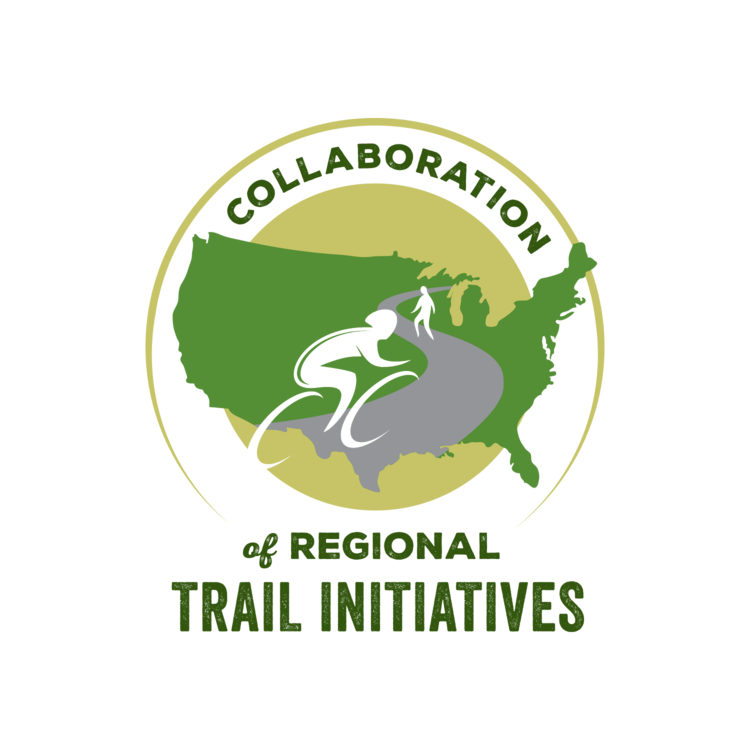History of CRTI
Purpose and Goals of CRTI
The Collaboration of Regional Trail Initiatives is a loosely held organization that serves as a forum for the exchange of ideas and experiences in the planning, design, development, funding, operations, and management of metropolitan and regional trail systems. CRTI involves trail system governing organizations from across the United States through a convening that occurs once a year. The purpose of the convening is to facilitate discussion centered on the concepts, issues, opportunities, challenges, and daily experiences that shape the growth and function of metropolitan and regional trail systems. The goals of convening are to foster peer-to-peer exchange and professional perspectives that meet the needs of those systems and governing organizations. There is no other organization in the United States that currently provides the specific convening format hosted by CRTI.
CRTI Purpose supported by The National Trails System Act
CRTI fulfills an important role in the expansion and development of America’s national trails system. As a convener and forum for the exchange of concepts and ideas for metropolitan and regional trails, CRTI addresses subjects that are shared among the governing organizations of these trails, including planning, design, development, funding, operating, and managing large-scale metropolitan and regional trail systems. CRTI focuses on improving access for all Americans, studying the interrelationships of trails and Class 1 railroads, as well as the variety of funding that supports trail development and operations.
In 1968, President Lyndon Johnson signed into law the National Trails System Act (NTS). The NTS called for establishing trails in both urban and rural settings for people of all ages, interests, skills, and physical abilities. The act promotes the enjoyment and appreciation of trails while encouraging greater public access. From the federal perspective, the NTS establishes four classes of trails: national scenic trails, national historic trails, national recreation trails, and side and connecting trails. The NTS also spells out the role of Federal agencies in the development of State and Metropolitan Trails. The Act specifically calls out the responsibilities of Interior, Housing and Urban Development, Agriculture and Transportation in supporting the development of trails within and surrounding urban areas. Further, the NTS defines the role Transportation, Interior and the Interstate Commerce Commission play in administering the Railroad Revitalization and Regulatory Reform Act of 1976.
How is CRTI Organized
The Collaboration of Regional Trail Initiatives is a loosely held ad-hoc organization that was formed in 2018 as a forum for the exchange of ideas and experiences in the planning, design, development, funding, operations, and management of metropolitan and regional trail systems. Since 2018, CRTI has operated under the guidance of the Pennsylvania Environmental Council (PEC), which has taken on the role of co-host and principal convener. PEC has partnered with Chuck Flink, FASLA, of Greenways Incorporated, and Sarah Clark, of the Institute for Conservation Leadership, to co-host convenings in metropolitan areas across the nation.
History of Convening
There have been seven convenings of CRTI since its inception:
2017
In the fall of 2017, Davitt Woodwell, President of the Pennsylvania Environmental Council (PEC) and Patrick Starr, Vice President of PEC, contacted Chuck Flink, FASLA, President of Greenways Incorporated to discuss their need for assistance in planning for the future of the Circuit Trails in the Philadelphia region. Specifically, Woodwell and Starr were interested to know if there was a (single and responsible) regional trails/greenways organization that would assist in shortening the learning curve on how regional systems are planned, design, construction, operated and managed. As a result of this conversation, a proposal was put forward to convene (in the spring 2018) similar regional trail/greenway organizations in Philadelphia, with the purpose being to conduct a peer-to-peer review among these organizations. This was labeled a “convening” and not a “conference” with the idea that it was a practical discussion among participants, centered around an exchange of ideas. Flink was instrumental in connecting PEC with several different regional trail organizations across the country.
2018
A convening planning committee consisting of Woodwell, Starr, Flink, along with Jeff Olson, of Alta, Jeff Ciabotti of Toole and PEC staff Frank Maguire and Laura Bray met virtually to plan the first gathering in Philadelphia. The convening took place on March 7 – 9, 2018. William Penn Foundation was the financial partner for the convening and agreed to pay participants hotel and meeting expenses. Invited participants stayed at the Kimpton Hotel in downtown Philadelphia and the convening occurred at the Cira Center. A total of 45 participants, representing 20 different regional trail organizations, attended the convening. Sarah Clark with the Institute for Conservation Leadership was employed by PEC as convening facilitator.
At the conclusion of the first convening, Davitt Woodwell asked if any organization or participant would have an interest in hosting a second convening. Gary Vernon with the Walton Family Foundation responded in the affirmative and asked that participants travel to Arkansas in 2019, as guests of the Foundation, to experience first-hand in the results of investments in regional greenways. Most notably the Razorback Regional Greenway (designed by Chuck Flink, FASLA and Jeff Olson, AIA)
2019
In March 2019, a second convening took place in Bentonville, Arkansas. Visit Bentonville and the State of Arkansas served as official hosts. The Walton Family Foundation provided financial support for the convening. Sarah Clark of ICL continued as convening facilitator. The planning committee included the original members, and participants from the State of Arkansas, Visit Bentonville and Walton Family Foundation staff.
The convening took place from March 14 – 16, 2019. Participants stayed at the 21c Museum Hotel, and the convening took place at the WalMart World Room in the WalMart Museum, Bentonville, AR. Participants completed a bicycle ride along the Razorback Greenway and worked in breakout sessions to determine the future of CRTI. A total of 49 participants attended the convening, representing 25 different regional trail and greenway organizations. Sarah Clark of ICL was the convening facilitator for a second year.
2020
Due to COVID, the 2020 convening was virtual. Sarah Clark continued in her role as convening facilitator. The convening took place from June 17 to 18, 2020. The 2020 virtual convening focused on “Pathways to the Future: Greenways and Trails as Equitable, Healthy and Resilient Landscapes.” The primary focus was on achieving equitable outcomes and inclusivity for all Americans. The featured speakers were Charles Thomas of Outward Bound Adventures and Charles Brown of Rutgers. Sarah Clark of ICL facilitated the online convening.
2021
With COVID still in full impact, the planning committee decided on a second virtual convening, which occurred on October 20 and 21, 2021. The 2021 virtual convening focused on following the “Arc of a Project” from concept to construction. The convening included personal testimonials from CRTI participants on strategies being deployed to overcome the challenges of COVID-19. A total of 40 participants from 20 different regional organizations attended the day-and-a-half convening. Sarah Clark of ICL facilitated the virtual convening.
2022
In June 2022, the Ralph Wilson Foundation and Greater Buffalo Community Foundation hosted the third in-person convening in Buffalo, New York. The two-day convening, on June 9 and 10, 2022, “Mission Critical: Connecting to Address Opportunities and Increase Impact.” The convening focused on four primary topics: equitable access for all, improving working relations with Class 1 railroads, an update on federal funding and a look at how regional systems address operations and management. Fifty participants, representing 25 regional greenway organizations, attended the in-person gathering in Buffalo. Sarah Clark of ICL served as the convening facilitator.
2023
In June 2023, the Pennsylvania Environmental Council, with support from the Richard King Mellon Foundation, will host the fourth in-person convening in Pittsburgh, PA. Approximately 75 individuals, representing 48 different organizations participate. The two- and half-day, from June 14 to 16, 2023, convening focused on “Compression and Release.” Participants engaged in thought-provoking discussions and for the first time in convening history, mobile workshops were deployed as part of the educational format, focused on a variety of local community topics. Participants experienced a variety of settings that encouraged peer-to-peer learning and socialized with colleagues from around the country. Social activities included sharing resources and case studies of challenges and success. The convening once again delved deeply into four topics of interest: equitable access for all, improving working relations with Class 1 railroads, an update on federal funding and a look at how regional systems address operations and management. Sarah Clark of ICL served as the convening facilitator.
2024
In June 2024, the Great Rivers Greenway hosted CRTI 2024 in the St. Louis metropolitan area of Missouri. Financial support came from a variety of philanthropic and business interests including the Helen and William Mazer Foundation, Edward D. Jones, Magnificent Missouri River City Outdoors, Great Rivers Greenway Foundation, Brumidi Group, Ozark Greenways, The Fund for the Environment and the William A. Kerr Foundation. It was the first convening funded by multiple financial partners. The theme of CRTI 2024 was “Gateway to the Future: The Constancy of Change.” Following on the success in Pittsburgh, the educational sessions were conducted on June 5 to 7, 2024, as mobile workshops, enabling participants to travel on guided bus and bike rides to destinations across the city. A total of 58 participants attended the two-and-a-half-day convening, representing 32 regional greenway and trail organizations. Sarah Clark of ICL served as the convening facilitator.

